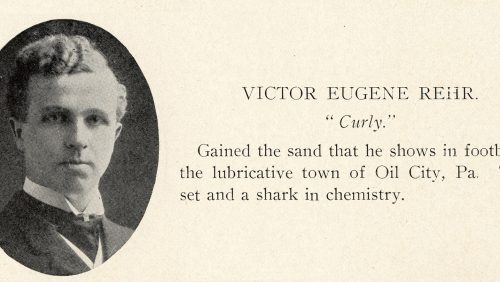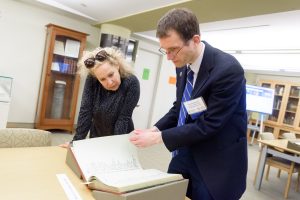The College Archives: Committed to Trinity’s Past and Future
A Bicentennial Essay by Eric Stoykovich, College Archivist and Manuscript Librarian, Watkinson Library

A photograph of my great-grandfather, one of twenty-six graduates in the class of 1906, sits above my desk at home. Taken in the middle of his life, the photo dates from the late 1920s, around the time he became a realtor following a career as chemist, purchasing agent, general manager, and director of a corporation. A product of a public high school in northwestern Pennsylvania, Victor E. Rehr was presented with his class in Trinity’s student yearbook (The Ivy) with the nickname “Curly” and was described as “thick set and a shark in chemistry.” He is featured in seven different group photographs in that year’s Ivy.
This vignette about my ancestor—the extra details that move beyond the single photograph of a middle-aged man—could not have been written easily without the Trinity College Archives. Though obituaries and city directories might chart his evolution into the managerial ranks of the middle class, members of my family never told stories, nor did they save documents with specific details, about Victor Rehr’s career. Utilizing the print publications and manuscript records contained within, and made available in, the Watkinson Library, I have become better informed about my own family.
As we mark the Bicentennial, I have often thought of the value proposition of the Trinity College Archives and how it helps to preserve the institution’s past and to inform our collective future. As Trinity embarks on its third century, the Watkinson Library and College Archives preserve not just memories and memorabilia, but are themselves places which shape a sense of belonging on Trinity’s campus.
A Professional Archives

It goes without saying that Trinity is not the same institution that started with a charter from the State of Connecticut 200 years ago. To me, one of the most important changes initiated later in its history was the decision of Trinity administrators to hire a permanent staff of professional librarians. As the yearbook which featured my great-grandfather stated, “The College Library, numbering 49,000 volumes, is under the superintendence of a professional librarian, who guides the students in the use of books.” Replacing a cadre of part-time or student librarians, this move towards professionalism addressed a confluence of needs at the dawn of the 20th century that included both a greater emphasis on research by faculty and a desire to provide students with a well-stocked and easy-to-access array of current books and periodicals in any academic course at Trinity.
One hundred and twenty-five years later, the Trinity College Libraries and Digital Learning team—in which the Watkinson Library and College Archives is situated—is a small but mighty unit of highly-trained professionals within the Library and Information Technology Services division. As the College Archivist, I am not flying solo. I depend on librarians and archivists who can arrange, describe, and catalog old and newly-acquired collections. Professionalizing the library and archives staff has been a testament to one way in which Trinity strengthened its commitment to the liberal arts and sciences, providing students a glimpse of the world beyond the core disciplines. From wherever an internet connection exists, students now interact with the library staff and multi-formatted information resources.
At the same time the College Archives is taking steps to make its collections of archival documents, college publications, and alumni memorabilia more accessible digitally, the content is prioritized physically. The vision of the College Archives is that archived information about the College should be accessible online to students, faculty, staff, and, when possible. The expertise and knowledge of the library staff have been shared generously with generations of Trinity undergraduates who work as library and technology assistants, many of whom later come back to the Watkinson at Reunions or during Fall Weekend as alumni.
A Systematic Archives
The Trinity College Archives, as a systematic collection of materials, is relatively young. Though there had been college chroniclers and document collectors in the early 20th century like Richard S. Morris ’16, the Archives effectively began in the immediate period after World War II. In 1960 Assistant Professor of History Glenn Weaver proposed writing a “college history,” by which he meant a “written account” that interpreted “almost a century and a half of the College’s existence.” Weaver had, in fact, been asked by then-President Albert Jacobs to produce a narrative college history, and seven years later Weaver published the first of two intended volumes written with a focus on Trinity’s history as an institution of advanced learning with a long history worth reflecting upon.
To Weaver, memory was “both short and fickle,” meaning that an accounting of historical events at the College was subject to conflicting memories of individuals connected to it. What would solve the perennial problem of forgetting would be a physical book which aggregated and cited “source material,” and one which encompassed humanizing stories of the College’s presidents, faculty, staff, and students. He made a direct plea to alumni to make available to him their “letters, diaries, or other personal records” for extraction or use in a narrative history.
Weaver’s plea to Trinity’s alumni—renewed when he started writing a second volume of the college history that he never had the chance to complete—had encouraged a wholly unexpected ethos of collecting. Without much foresight, the collecting of materials useful for writing the College’s history gradually became important on its own terms. It became not just content for publishing an official narrative, but valuable documentation of the life and work of Trinity. By the early 1970s, when Reference Librarian Peter J. Knapp took over the task of building a Trinity-centered collection, the idea of wide and passionate collecting was entrenched.
More than 60 years later, the memorabilia and memories of Trinity’s alumni, faculty, and staff continue to find their way to the College Archives. During the last four years that I have served as Trinity’s College Archivist, I have had the privilege to meet with exuberant alumni from various classes who have shared their memories of their time at the College. Even during COVID, when in-person meetings were impossible, several members of the Class of 1970 celebrated their 50th Reunion in creative ways. They shared stories of Vietnam and their love of 1960s music online, and donated unique or personalized items to the Archives, such as beanies and college identity cards, that now appear in physical and digital exhibits.
Moving through the Digital Age
Among the many archival legacies left by Knapp, who spent over four decades in the role of College Archivist, is one which I hope to see fully realized in this first decade of Trinity’s third century: preserving institutional records. Applying a reasonable standard, the “institutional records” of Trinity College are materials created, received, or maintained by College personnel in conducting official business which have been evaluated by the College Archives for long-term preservation.
As Weaver suggested, institutional records appear to be the least colorful or inviting of the records in the College Archives. However, this has proven to be inaccurate, as they do include the ‘Biographical File of Victor E. Rehr,’ graduate of Trinity and my great-grandfather.
Under Treasurer Edgar F. Waterman, Class of 1898, the Treasurer’s Office created a particular set of records in the 1910s. Biographical files of alumni were initiated and originally maintained by Trinity’s Alumni Office, now known as the Advancement Office. Once a Trinity alumnus passes away, the biographical file is usually transferred to the College Archives, where we permanently store it and make it accessible to Trinity staff, family members, and others interested in researching details of family genealogy. Filled with various alumni questionnaires, original photographs, and manuscript letters—in addition to printed records like newspaper clippings and obituaries—these biographical files often illuminate matters that did not appear in the published records. Perhaps unsurprisingly, this rich material contains some original documents handwritten by Victor Rehr and his second wife, my step-great-grandmother, which attest to the value of maintaining even institutional records like these.
For the past few decades, Trinity College has begun to move to digital recordkeeping solutions, including various cloud computing options, for many critical college functions. What will the future of the College Archives be in this fast-paced world of digital records? Much more work remains to be done, and I am confident that, with proper support and careful planning, we will grow greater capacity to manage the accelerated lifecycle of digital records. After all, to be committed to Trinity’s past, the Watkinson Library and College Archives must also be committed to the future.